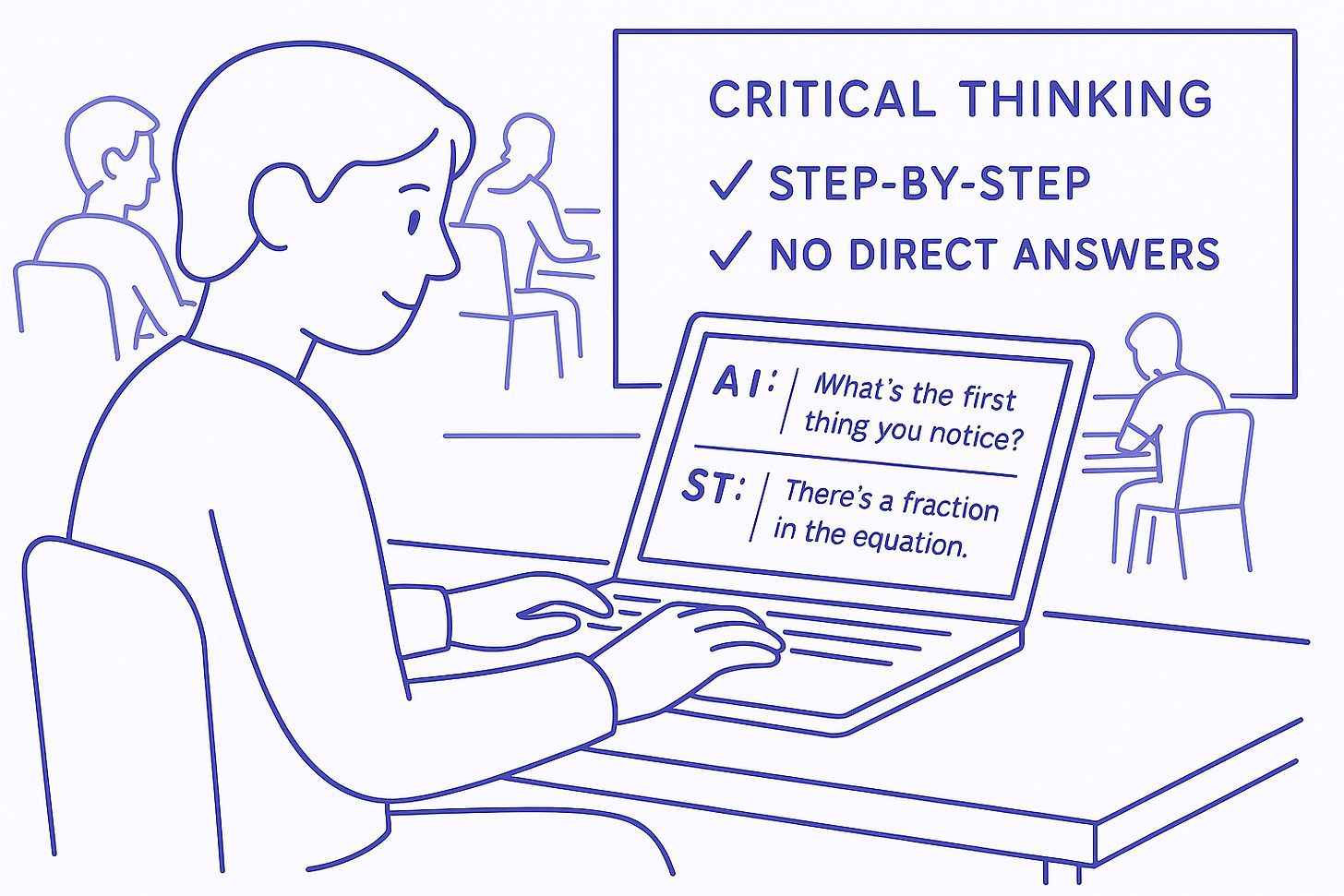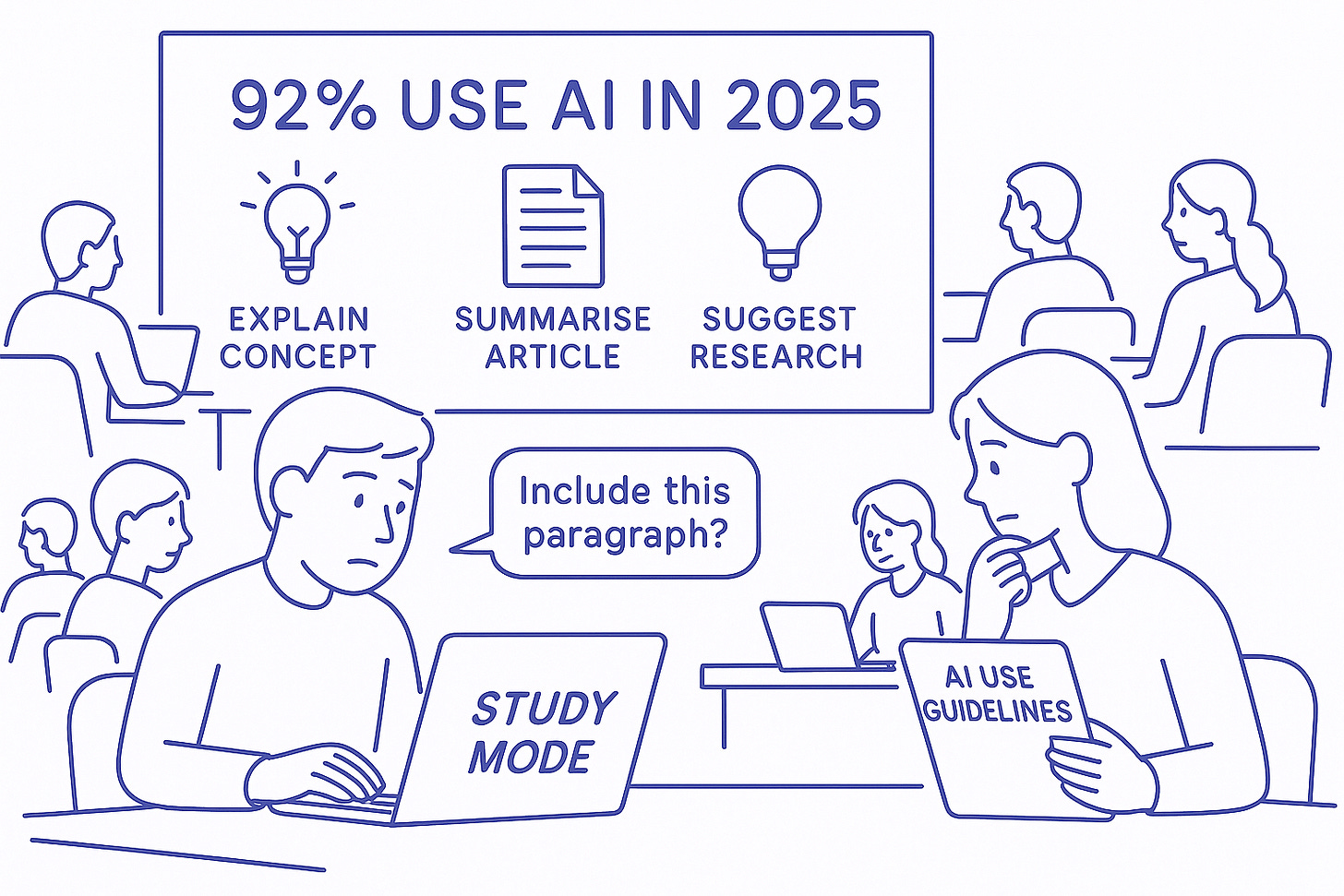ChatGPT Study Mode Activated
Curated AI education news for week 31 in 2025.
Good morning educators!
This week, OpenAI launches Study Mode to combat AI-driven cheating in schools, whilst new UK survey reveals 92% of university students now use AI tools. Government guidance emphasises early adoption as schools integrate AI into teaching and administrative tasks.
In This Week's News
OpenAI introduces Study Mode in ChatGPT to promote active learning rather than passive copying
HEPI survey shows dramatic surge in student AI use, from 66% to 92% in one year
UK government publishes insights from early AI adopters in schools and colleges
US Department of Education issues new guidance on leveraging AI grants for education
Survey reveals only 36% of students receive institutional support for developing AI skills
OpenAI Launches Study Mode to Combat Academic Cheating
OpenAI has released Study Mode within ChatGPT, a new feature designed to help students work through problems step-by-step rather than simply providing answers.
Details:
The tool uses guiding questions to engage students in critical thinking
Available to Free, Plus, Pro, and Team users immediately
ChatGPT Edu users will receive access within the next few weeks
Developed with input from teachers, scientists, and pedagogy experts
Responds to concerns about AI enabling widespread academic cheating
Why it matters: With one in three college-age students already using ChatGPT, this represents a significant shift towards responsible AI use in education that could help preserve academic integrity whilst maintaining the benefits of AI assistance.
CNBC, July 29, 2025
UK Student AI Usage Surges to 92% in 2025
The Higher Education Policy Institute's annual survey reveals that 92% of full-time undergraduate students now use AI in some form, marking a dramatic increase from 66% in 2024.
Details:
88% have used generative AI for assessments, up from 53% in 2024
Main uses include explaining concepts, summarising articles, and suggesting research ideas
18% of students admit to including AI-generated text directly in their work
Women and less wealthy students report greater concerns about academic misconduct
80% agree their institution has a clear AI policy
Why it matters: The rapid adoption rate highlights the urgent need for educators to integrate AI literacy into curricula and reassess traditional assessment methods to maintain academic standards.
HEPI, July 31, 2025
📌 AI Education News in Brief
Government Shares Insights from AI Early Adopters in Schools UK schools and colleges using AI report significant benefits for reducing teacher workload, particularly in lesson planning and resource creation. GOV.UK, June 27, 2025.
Digital Divide Widens in AI Adoption Among Students The HEPI survey reveals growing disparities in AI use between wealthy and less affluent students, with STEM students showing greater enthusiasm for AI tools than humanities peers. HEPI, July 31, 2025.
Only 10% of Educational Institutions Have Official AI Frameworks Despite widespread AI adoption, UNESCO research indicates that merely 10% of schools and universities have established formal guidelines for AI use, creating uncertainty for educators. UNESCO, February 3, 2025.
🔬 AI Studies Released This Week
Student Perspectives on AI Assessment Show Mixed Response New HEPI research finds students divided on AI-assessed exams, with 34% saying they would increase effort, whilst 29% would reduce effort if AI marked their work. July 31, 2025. HEPI
🌍 In Other AI News
College graduate unemployment reaches record highs as AI displaces entry-level roles in customer service and data entry. Crescendo AI
Stanford University hosts third AI+Education Summit, bringing together K-12 leaders and technologists to explore AI's impact on teaching. Stanford Accelerator for Learning
US Department of Education releases Dear Colleague Letter on leveraging federal grants for AI in education outcomes. U.S. Department of Education
AI translation technology enables international students to participate in global classrooms without language barriers. London Daily News



